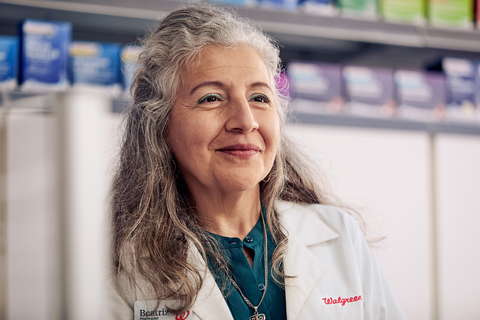Walgreens Launches Gene and Cell Services as Part of Newly Integrated Walgreens Specialty Pharmacy Business
- Walgreens Specialty Pharmacy combines existing specialty assets, fully integrates AllianceRx and represents the company’s latest step to leverage its neighborhood pharmacies into fast-growing areas of healthcare
- Investments include new Gene & Cell Services Pharmacy and Innovation Center

Walgreens Specialty Pharmacy has more than 1,500 specialty-trained pharmacists, 5,000 patient advocacy support team members and ten dedicated Specialty360 teams that support all specialty conditions and therapies. (Photo: Business Wire)
Under the new business, Walgreens Specialty Pharmacy has an unmatched offering and is the only specialty pharmacy in the market with the following services and assets at scale:
-
Gene and Cell Services Pharmacy and Innovation Center – a dedicated 18,000-square-foot center in
Pittsburgh, PA , with services and capabilities for these emerging therapies, including innovative solutions for managing the complexity of the supply chain, logistics and financing as well as clinical and social needs management to ensure success for patients and partners. - Four central specialty pharmacies – each holding several national pharmacy accreditations – where pharmacists and care teams across the country work together to dispense highly complex medications and help patients manage chronic or rare diseases and conditions. These pharmacies hold distinctions in oncology and rare/orphan conditions and offer patients and caregivers clinical services that drive engagement, adherence and outcomes.
- Nearly 300 community-based specialty pharmacies across the nation – more than any other pharmacy. These specialty pharmacies are strategically located near medical office buildings and health systems, closely aligning care provision with local physicians, offering patients access to specialty medications faster than the industry average, as well as services like injection training, medication side-effect management and financial assistance coordination for medications.
- More than 1,500 specialty-trained pharmacists, 5,000 patient advocacy support team members and dedicated Specialty360 teams that support all specialty condition and therapies.
- A growing roster of 240 limited distribution drugs, including 40 narrow networks and 12 exclusive limited distribution drugs.
Walgreens Specialty Pharmacy is focused on breaking through healthcare system silos, bringing convenient access to hard-to-find medications and critical adherence support. Building upon the deep, trusted relationships Walgreens pharmacists have with providers and communities, the model enables more comprehensive care to ultimately help payers better manage specialty costs.
Accelerating Walgreens growth in one of the fastest-growing market segments
Specialty medications today account for more than
“With approximately
Walgreens is building on its decades of experience serving the specialty pharmacy needs of commercial, Medicaid, Medicare, and other government and private payers. The company provides services or access to nearly all pharmacy benefit managers and major health plans— as well as alternative payment and service models that help health plans and PBMs differentiate themselves for their clients and members.
Delivering an integrated care model to patients who need it most
Effective August 1, 2024, AllianceRx Walgreens Pharmacy will become Walgreens Specialty Pharmacy. Patients of AllianceRx Walgreens Pharmacy and Walgreens community-based specialty pharmacies now have access to resources that will build upon the expert care they already receive from their specialty pharmacist, including clinicians with key disease state expertise, nutritionists and care nurses. Specialty patients can also view their entire prescription profile at Walgreens, including their retail prescriptions.
“When a patient must confront a life-changing, serious health challenge and begins therapy for a chronic or complex condition, our pharmacists are right there to guide and care for them throughout their healthcare journey —from helping them order and take their medication to identifying financial assistance opportunities and working with their doctor and insurance plan to make sure they’re receiving the most coordinated care,” Gates said.
In addition, Walgreens has seen consistent growth through its wholly owned subsidiary Shields Health Solutions, the nation’s premier health system-owned specialty pharmacy accelerator. Shields specialty model provides integrated care solutions for local health systems and specialty pharmacy patients, working with over 1,000 hospitals across 45 states. The Shields business will continue supporting health systems specialty pharmacies, which complement Walgreens newly enhanced specialty pharmacy offerings.
The launch of Walgreens Specialty Pharmacy is the company’s latest initiative aimed at expanding the role its pharmacy teams play in patients’ lives and bringing their clinical expertise to help payers, providers, pharmaceutical manufacturers and partners deliver critical healthcare. It also further supports Walgreens' efforts to achieve provider status for its pharmacists given their influence and integral role in healthcare delivery.
[1] IQVIA. Global Use of Medicines 2023. https://www.iqvia.com/insights/the-iqvia-institute/reports-and-publications/reports/the-global-use-of-medicines-2023
About Walgreens Specialty Pharmacy
Walgreens Specialty Pharmacy holds several national pharmacy accreditations and services are offered to nearly 300 million covered lives across the country. At Walgreens, the term “specialty” covers services and medications for patients with rare, complex and chronic diseases like cancer, cystic fibrosis and Crohn’s disease, who often require additional support from their healthcare providers. Walgreens specialty pharmacists have additional training to better understand these specialty medications which have unique storage, temperature, and handling requirements; are given by infusion, injection or taken orally; and require close patient monitoring and ongoing clinical support. They also help patients find affordable access to high-cost medications, help with adherence barriers and support patients throughout their treatment.
About Walgreens
Walgreens (www.walgreens.com) is included in
View source version on businesswire.com: https://www.businesswire.com/news/home/20240424326589/en/
Erin Loverher
Walgreens Media Relations
media@walgreens.com
Source: Walgreens







